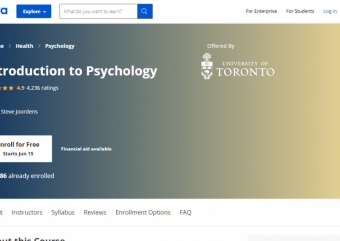7 Lessons For Becoming A Standout Writer
Tags: Writing
Tested Techniques for Fast Writing Skills Improvement
Last updated 2022-01-10 | 4.6
- Write clear- precise
- and direct prose
- Find alternative ways of constructing sentences
- Communicate better with readers
What you'll learn
* Requirements
* Word processing software like Microsoft Word or OpenOfficeDescription
One of the high-rated writing courses on Udemy
4.77 out of 5 all time student rating (95.4%)
35 5-Star reviews
Taught by a UNIVERSITY PROFESSOR, Dr. Duncan Koerber
What students say...
"Excellent--I rate it ten stars out of five." — Julie Heyer, Udemy Student
"Take this course - improve your writing — end of story!" — James Cochrane, Udemy Student
"The content is fantastic." — Chris Lewis, Udemy Student
"Information that you can apply right away." — Kim Ruby, Udemy Student
"I can tell he's passionate about his work and he shows it throughout the lessons." — Ana, Udemy Student
"I recommend this course to anyone who wants to improve their writing." — Sheverley Maye, Udemy Student
"This is an especially useful and remarkably good course." — Avrohom Meir Greenhut,
Udemy Student
"The assignments forced me to become more objective and build better habits." — Marla Morris, Udemy Student
"The explanation of parallelism and its usage was simply amazing." — Bindu Midha, Udemy Student
Do you want to impress employers, editors, or online readers with your writing?
Do you want to get A grades on term papers and essays?
Do you want to become a good writer – in creative non-fiction, journalism, fiction, or academic writing – as quickly as possible?
The secret to this writing success is not studying 200 grammar and style points in the writing textbooks.
Instead, this course – designed by an experienced university professor and published author with Oxford University Press – shows you the sentence-level lessons you need to know to write well.
These are the 7 most common problems found in people’s writing.
These problems most likely lurk – like weeds – in your writing right now.
If you complete the lessons and exercises honestly and fully as outlined in this course, then your writing will improve in just a few weeks of intensive study. If you do not find this course helpful, you may request a refund within 30 days, no questions asked.
These lessons and exercises were designed and tested at the University of Toronto and York University with thousands of undergraduate students. Many students improved their grades by a whole grade category after completing these lessons, finding that this short list of key lessons provides clarity. Students have applied these lessons in the workplace to great success.
Join now and complete this course to produce writing that gets you the job, earns you an A grade, lands you a writing contract, or impresses that magazine or newspaper editor.
In this comprehensive course, I will help you:
See sentences more objectively;
Understand the factors that interfere with communication;
Remove dead language – such as dead verbs and weak nouns – from your writing;
Avoid embarrassing clichés;
Write more clear, direct, and precise sentences;
Use adjectives and adverbs more carefully, in targeted ways;
Write poetically and rhythmically with parallelism and sentence variation;
Add detail to your writing;
Become an original writer, not a copy.
Your writing transformation awaits...
Who this course is for:
- This course is primarily for beginning writers or intermediate writers looking to target trouble spots in their writing.
Course content
9 sections • 53 lectures
Welcome from the Instructor Preview 01:17
A welcome from the instructor.
How to Make the Most of this Course Preview 02:21
I explain the best way to use this course.
Economy Introduction Preview 03:54
Redundancy Preview 04:07
Remove wasted words and fillers from your sentences.
Phoney Intensifiers Preview 06:28
Little words like "very" contribute nothing to sentences. Remove them for better clarity.
Stretchers Preview 04:30
Stretchers are words that prolong sentences unnecessarily. Why use them?
Thickeners Preview 04:09
These kinds of words sound "big" but don't help you communicate. Avoid them.
Answers to Some Questions Preview 04:59
In this lecture, I respond to some questions students typically have about Economy.
Exercise #1
This is an exercise about wordiness. Have fun with this. Use examples of all four types of wordiness described in the lectures. Read your writing out loud and see how amusing it sounds.
Exercise #2
Now it's time to write as simply as possible, and this exercise provides that practice.
Verbs Introduction Preview 03:27
In this video, I outline the nature of verbs and some problems with verbs.
Concrete Verbs Preview 05:32
The best verbs are concrete or strong, which means they evoke images immediately.
Weak Verbs Preview 04:38
A step down from Concrete Verbs, Weak Verbs work -- sometimes -- but should be mostly avoided.
Dead Verbs Preview 05:01
Dead verbs are the worst verbs because they provide no images for the reader. Avoid them most of the time.
The Consequences of Dead Verbs Preview 04:54
Explains the outcomes of dead verbs on your writing.
Exercise #3
This exercise encourages you to think of action words.
Active Voice Introduction Preview 02:11
The active voice word order is preferred over the passive voice. Learn why here.
Active Voice Preview 04:06
Active voice word order is explained with a formula.
Passive Voice Preview 06:19
The passive voice word order is long and wordy -- see why.
The Morality of Passive Voice Preview 04:20
Passive voice word order isn't just wordy, it can raise moral complications.
Passive Voice Exceptions Preview 03:16
There are a few instances when using the passive voice word order is okay.
Exercise #4
This is the toughest exercise of the course. But if you can understand the concept and put it into practice, it will help your writing enormously.
Nouns Introduction Preview 01:31
This lecture provides an overview of the importance of strong nouns.
Nouns Preview 04:38
Understand what a noun is and how some nouns are better than others.
Weak Nouns Preview 04:04
Recognize how weak nouns are hurting your writing.
Pronouns Preview 02:32
Recognize the function of a pronoun and how to best use them.
When Pronouns Go Wrong Preview 05:28
Understand that pronouns can cause problems in writing, particularly when they have an unclear reference.
Exercise #5
This exercise brings nouns to life.
Original Writing Introduction Preview 04:15
A survey of the key ideas in this section.
Clichés Preview 04:52
See exactly what a clichés is and why it's such a problem in writing.
Why Do People Use Clichés? Preview 02:48
An examination of the reasons behind people's use of clichés.
When It's Okay to Use a Cliché Preview 02:24
Occasionally, it's okay to use a cliché. Learn about those instances in this lecture.
Being Original Preview 02:02
This lecture provides a final word on being original — it's not as hard as you think.
Exercise #6
This exercise is fun. Once you get cliches out of your system, never use them again!
Exercise #7
Now that you know what a cliché is, and you’ve hopefully read some original writing in quality publications, it’s time for you to create original language.
Parallelism Introduction Preview 04:38
A quick overview of the key principles of parallelism.
Surface and Under the Surface Parallelism Preview 02:53
Be able to see parallelism both in its surface and under the surface forms.
Verb Series Preview 03:02
Add more verbs to your writing with verb lists.
Noun Series Preview 02:12
Add more strong nouns to your writing with noun series.
Adjective Series Preview 02:10
Avoid sprinkling adjectives all over your writing by using -- occasionally -- adjective series.
Adverb Series Preview 02:42
Avoid peppering your writing with adverbs by using -- occasionally -- adverb series.
Preposition Series Preview 02:42
Preposition series can provide useful effects in writing.
Multiple Element Series Preview 04:33
Taking the "series" idea further, this lecture shows how you can combine grammatical elements to make more meaning in your writing.
Parallelism Conclusion Preview 02:17
A few final thoughts on parallelism as a technique.
Exercise #8
This exercise asks you to apply the simple types of parallelism.
Exercise #9
This exercise requires you to create more complex parallel structures.
Sentence Variation Principles Preview 03:59
An overview of the principles of sentence variation discussed in this section.
Sentence Patterns Preview 05:18
Five patterns that students can use to vary their sentences.
Short Sentences Preview 02:53
Recognize how to use short sentences for effect in action and in presenting important points.
Long Sentences Preview 04:20
The long sentence -- often called the freight-train sentences -- creates certain effects in writing.
The Variation of Long and Short for Effect Preview 02:19
See the contrast that occurs when a short sentence comes after a long one.
Exercise #10
This exercise helps you play with the length of sentences.








 This course includes:
This course includes:
![Flutter & Dart - The Complete Guide [2022 Edition]](https://img-c.udemycdn.com/course/100x100/1708340_7108_5.jpg)















